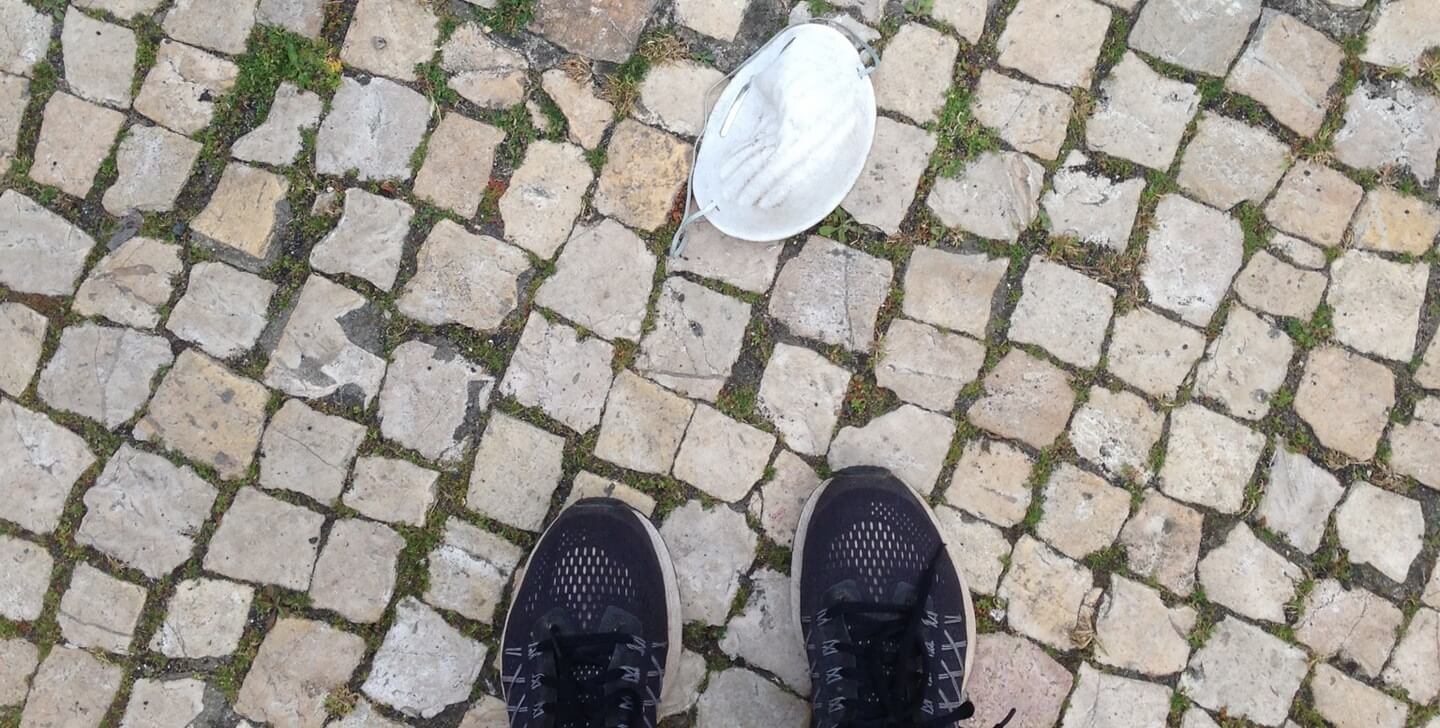It was my first attempt to directly experience the outside world. About five weeks had passed since March 18th, 2020, the day the Portuguese authorities declared that the country was in state of emergency due to the COVID-19 global pandemic. Driven by an almost ravenous appetite for another way of experiencing the lockdown and learning what we were in Lisbon at that point, I decided to take the metro in hopes of seeing a friend for a short walk. Startling uncertainties is what I remember feeling during that day, partly due to the astounding silence and emptiness of the station, and partly due to the novelty of a sufficiently-changed world I had not encountered while in confinement. I was experiencing in situ and for the first time other forms of public emotion, interaction, and communication of an emergent pandemic world. I felt that hope was placing me not in the sunny everything-will-get-better narrative, but in the premise that there had to be room to act within the spaciousness of that sheer unknown-ness and silence I was experiencing while waiting for the metro—alone or in concert with a dozen or several million others.
Unknown-ness: all too suddenly it arrived in the Portuguese capital, officially and somewhat aggressively introduced on that March 18th, two days after the first COVID-19 death was reported in the country. From that day on, the sequence of official steps went roughly as follows: the economy, much like educational, cultural, and entertainment institutions, was shut down; mandatory confinement and fear-inducing guidelines for social conduct were imposed by President Marcelo Rebelo de Sousa, who would later extend the national lockdown period to May 2nd; the police stepped up surveillance measures to enforce social distancing, with the use of drones both in Porto and Lisbon, and alcohol control; borders, both air and land, were closed, and work acquired a new geography and aesthetic: from kitchens, living rooms, and bedrooms to porches, balconies, and terraces, often filled with plants, kids, and pets. As a further step, the use of masks became mandatory indoors, group gatherings were restricted, and hygiene and respiratory etiquette, if you will, was the order of the day.
The additional steps the Portuguese authorities took to contain the virus on a large-scale political and legislative dimension, though controversial to some, is worthy of remark. Those included, among others, an emergency support plan of 1 million euros for artists and cultural entities, cooperation agreements with the social sector, the repatriation of around 4,000 Portuguese citizens who were living abroad, an exceptional policy of forgiveness for minor sentences and the release of a considerable number of inmates, mandated forbearance on mortgages and distribution of relief funds, and the much-praised granting of temporary residency rights to all migrants and asylum seekers until July 1, 2020. Besides ensuring the legally-constrained and vulnerable in the country could have access to public health care and medication, the latter measure, in particular, also assured much needed legal status to those populations, softening their fear of stigma and discrimination while guaranteeing their access to social security benefits, bank accounts, and work and rental contracts.
That emergent space to act I was experiencing while waiting for the metro that day could find an even more hopeful translation, I would later be aware, in the more spontaneous, grassroots reactions to the pandemic. In Lisbon, the local, communitarian, and personal initiatives that were spawned by those reactions took the shape of a more humanistic and animating response to the urgent, mainstream, institutional measures the Portuguese government was carrying out at a national and global level. Ranging from alternative support networks to help elderly, homeless, and unemployed people with basic supplies (including food, water, and hygiene products), to urban interventions with flowers, graffiti, music on porches, evening clapping to acknowledge the work of nurses and doctors, and flyers and short notes with motivational messages all over the city, these societal minor-scale reactions put ordinary people and the role of the community at the center of the debate concerning political action, and reminded us that leadership, compassion, collaboration, and service remained as vital as ever.
After the initial period of fear, shock, and numbness, I started to be driven by the wish to be part of these more localized, community-driven, and alternative models of communication and action. I decided to volunteer at a temporary emergency shelter set up to ensure accommodation, basic supplies, and dignity for COVID-19-vulnerable populations in Lisbon and created micro-communities of support with friends and colleagues, including drawing, storytelling, reading, and accountability groups. Though quite different in spectrum, purpose, and audience, I felt that both responses allowed me to experience the pandemic in various ways to create a stronger, more effective ethical and human response to the escalation of my own Coronavirus outbreak, the one I was personally, emotionally, and spiritually going through while transitioning to this new normal.
Finding myself taking the metro once again to head back home after walking with my friend, I wondered about the legacy of the virus and to what extent it was turning history and humanity on their heads. I wondered, too, what it was already teaching me besides the usual ideas for developing a more humanistic spirit and sense of social and environmental responsibility. COVID-19 was teaching me that, the more I take for granted “the way things are,” the more easily I am thrown off balance when they change. And that perhaps I am more deficient in motive than opportunity. What is for sure, though, is that we, as humanity, are no longer able to tell ourselves the same old stories, that there are no alternatives to live a more sustainable, equitable, and balanced life, and especially no costs associated with the choices we make, either at a physical, emotional, political, or spiritual level.


